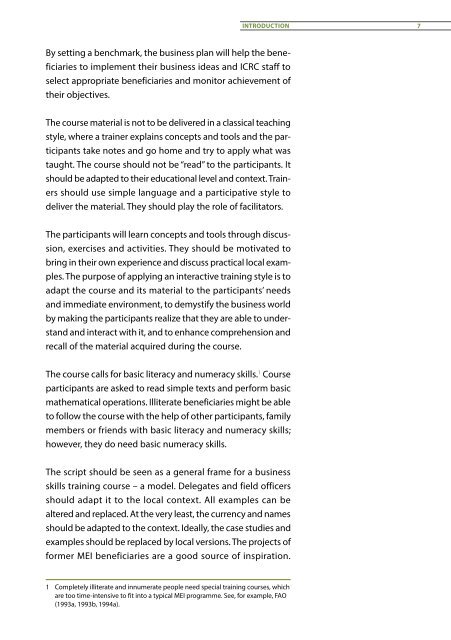new business module
You also want an ePaper? Increase the reach of your titles
YUMPU automatically turns print PDFs into web optimized ePapers that Google loves.
INTRODUCTION 7<br />
By setting a benchmark, the <strong>business</strong> plan will help the beneficiaries<br />
to implement their <strong>business</strong> ideas and ICRC staff to<br />
select appropriate beneficiaries and monitor achievement of<br />
their objectives.<br />
The course material is not to be delivered in a classical teaching<br />
style, where a trainer explains concepts and tools and the participants<br />
take notes and go home and try to apply what was<br />
taught. The course should not be “read” to the participants. It<br />
should be adapted to their educational level and context. Trainers<br />
should use simple language and a participative style to<br />
deliver the material. They should play the role of facilitators.<br />
The participants will learn concepts and tools through discussion,<br />
exercises and activities. They should be motivated to<br />
bring in their own experience and discuss practical local examples.<br />
The purpose of applying an interactive training style is to<br />
adapt the course and its material to the participants’ needs<br />
and immediate environment, to demystify the <strong>business</strong> world<br />
by making the participants realize that they are able to understand<br />
and interact with it, and to enhance comprehension and<br />
recall of the material acquired during the course.<br />
The course calls for basic literacy and numeracy skills. 1 Course<br />
participants are asked to read simple texts and perform basic<br />
mathematical operations. Illiterate beneficiaries might be able<br />
to follow the course with the help of other participants, family<br />
members or friends with basic literacy and numeracy skills;<br />
however, they do need basic numeracy skills.<br />
The script should be seen as a general frame for a <strong>business</strong><br />
skills training course – a model. Delegates and field officers<br />
should adapt it to the local context. All examples can be<br />
altered and replaced. At the very least, the currency and names<br />
should be adapted to the context. Ideally, the case studies and<br />
examples should be replaced by local versions. The projects of<br />
former MEI beneficiaries are a good source of inspiration.<br />
1 Completely illiterate and innumerate people need special training courses, which<br />
are too time-intensive to fit into a typical MEI programme. See, for example, FAO<br />
(1993a, 1993b, 1994a).


